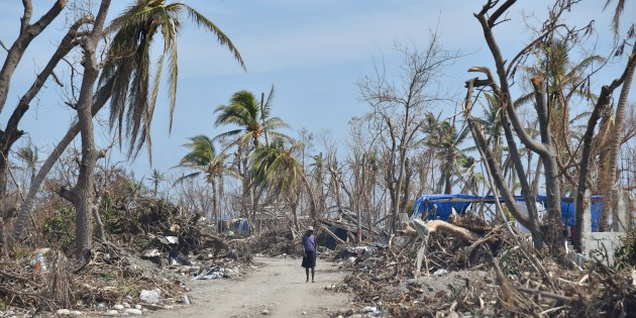Health leaders implore government to do more, from a public health standpoint.
 |
| A woman in Les Cayes, Haiti, following the passage of Hurricane Matthew. AFP/Getty Images |
The Climate and Health Alliance (CAHA), along with a number of healthcare and nursing groups, hosted the meeting of around 40 professionals in Parliament House. Assistant Health Minister Ken Wyatt, Shadow Health Minister, Catherine King, and Greens leader Richard Di Natale attended, hearing about how climate change is a "public health emergency", according to CAHA executive director Fiona Armstrong.
"There has been advocacy on climate change over several years, but we're concerned that as the issue becomes more urgent, there has been a failure to reflect the concerns of the health sector in climate policy decisions," she told The Huffington Post Australia.
"The health sector is committed to a public policy response. We'd like to work with the government to get a solution, beginning a discussion about what a public health framework would like."
Armstrong said climate change was about more than rising sea levels, that there are obvious -- and less obvious -- health implications. Continuing to burn fossil fuels for energy causes air pollution, leading to asthma and other respiratory problems; that's a clear one. Heatwaves leading to heat stroke, exhaustion and heat stress are another. However, wild and rapidly changing weather events can wreak massive devastation and cause huge health issues, such as Hurricane Matthew in Haiti and Florida just this week where more than 1000 were reported dead.
"Health impacts of climate change are very diverse. There are direct impacts and then the less direct, but it is is being described as the greatest threat to public health," Armstrong said.
"It's being emphasised by the World Health Organisation, and we're urging all governments to take action on climate change. To be frank, its a public health emergency."
A recent report by CAHA found that Australia's health community thought the country was underprepared for the challenge of climate change-related health issues. It found that 52 percent of health professionals considered the government's direct action plan 'not at all effective'; 78 percent thought Australia's climate policies were not consistent with our international obligations, including the Paris Agreement; and that 98 percent agreed Australia needed to develop a national strategy on climate, health and well-being. Read the full report here.
Armstrong said the politicians attending the meeting had seemed receptive and eager to learn about the intersection of climate and health, and how to prepare Australia's health sector for the incoming climate-related issues. She added, however, that urgent action to lower emissions was the most important immediate priority.
"Mitigation is a top-line issue. Unless we're mitigating then we're not addressing the cause of the problem. Emissions reductions targets must be consistent with the science. Australia needs to accept its fair share of the responsibility, to be a good global citizen, and not be consuming the emissions budgets of developing nations who are using a range of energy systems to lift their populations out of poverty," Armstrong said.
"As a wealthy nation we've emitted our fair share in the past. We have the wealth to get our way to a zero emissions society."
"The health sector is already under considerable pressure. Climate change amplifies every risk factor there is, in every sector. Unless health sector is assisted to develop its climate responsiveness, it may become overwhelmed and unable to respond."
Links
- Climate & Health Alliance
- Hurricane Matthew Death Toll Tops 1,000 In Haiti
- Australia | Healthcare professionals concerned about climate impacts, says survey
- Medical Staff In Dark About Policies To Mitigate Health Risks Of Climate Change, Study Says
- Lethal Heating: Seven Ways Climate Change Affects Our Health
- Climate Change Health Risks Will Hit The Poor Hardest – So What Can Be Done?


No comments :
Post a Comment